by Kelli Stuart | Motherhood, Product Review, World War II, Writing
Reading books with children in the house is a bit like trying to brush your teeth while eating Oreos.
It’s counterproductive.
Finding time to read has been a challenge since I took on the title of “Mom”. Where once upon a time I devoured books, now I simply nibble at stories here and there. Bedtime is my favorite time to read, but many days I find myself so exhausted by the time I lay down that my eyes close just minutes after cracking open my book.
In recent months, I’ve made more of an effort to fit reading back into my days. My reasons have been two-fold: First, I just miss reading. I miss getting lost in a book. Second, I want my kids to see me reading.
With the onslaught of social media, and the ever present electronics, I’ve found that motivating my children to read has become increasingly difficult. Too may other things vie for their attention, and reading is a chore. It is one more thing to check off the list so they can have their electronic time.
By sitting down in the middle of the room and reading in front of them, I hope to show my kids that reading is actually an acceptable, and even enjoyable, pastime. If I only read before bed, then they naturally assume that I never read books, either. And if I don’t do it, why should they?
It’s a huge challenge, but the effort has been worth it. I finished three books in January, which isn’t necessarily brag-worthy, but it’s something!
Below, I’m going to leave my review of the most recent book I finished, Everyone Brave is Forgiven. But first, tell me: When do you find time to read? Do you set reading goals for yourself each year, or just see what happens? Do you try to read in front of your kids?

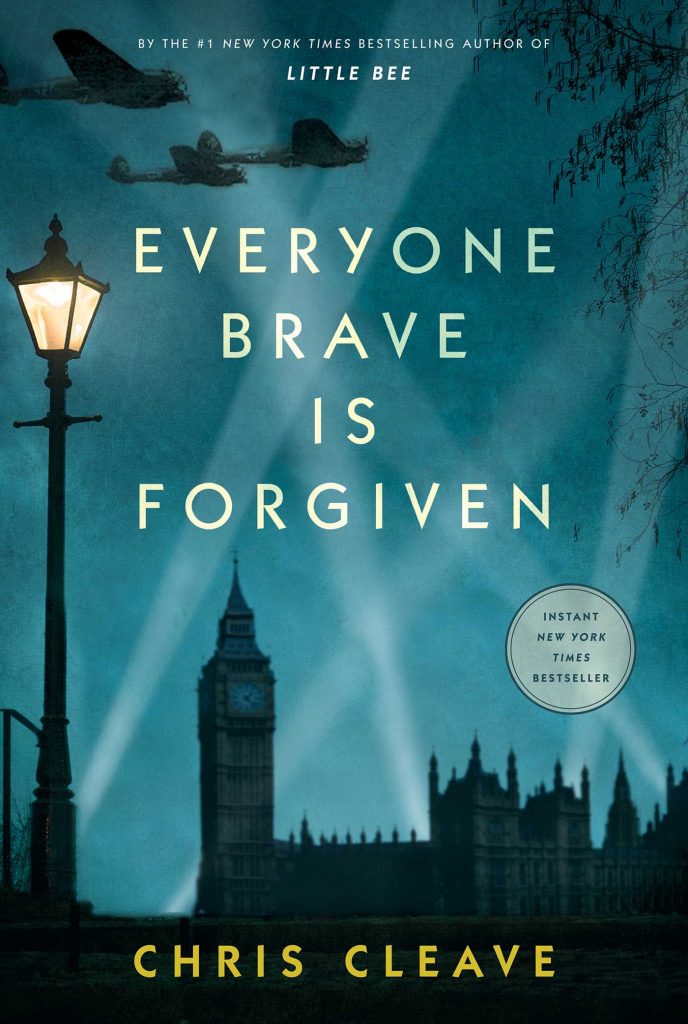
I’m honestly still processing this book, trying to discern how I feel about it.
On one hand, it might be one of the most beautiful books I’ve ever read. The story in and of itself wasn’t overly impressive or unique, but the language used to tell the story was achingly poetic and rich…most of the time.
Sometimes, I simply didn’t know what the author was saying.
Chris Cleave is undoubtedly an incredibly talented writer. His use of language to describe a scene is awe-inspiring, and there were several times that I found myself rereading a paragraph just to soak in the description again.
“She laughed then, brightly and without complication, and he laughed too, and for a moment the war with its lachrymose smoke was blown away on a bright, clean wind.” (Everyone Brave is Forgiven, pg. 173)
Besides the face that I had to look up “lachrymose” to see what it meant (“tearful”), it was descriptions like this that often gave me goosebumps.
Sometimes, however, the descriptions were so wildly cheeky, I couldn’t for the life of me figure out what was being said.
“Rubble to build on caught no one’s attention but theirs. It did not catch the light, having no promise but what the brought with them. He tried not to be afraid. London was a lightening of the sky. It was the bloody last hour of a milk tooth. It was a city dying to begin.” (Everyone Brave is Forgiven, pg. 402)
I think I know what he was saying there, but I had to read that entire page several times before I finally just gave up and moved on.
As for the story itself, it was a sad one, but the war was a sad time, wasn’t it? My American sensibilities are constantly in conflict with the painful reality of history. Happily ever after is a notion that doesn’t fit well into the back drop of World War II, so as stories go, I appreciated the realism, even if I occasionally wish things could turn out differently.
In the end, I would recommend this book to others on the caveat that you may want to keep a dictionary nearby. And understand that this isn’t one of those quick beach reads. This is more a book to be savored, read slowly and digested carefully.
*affiliate links included
by Kelli Stuart | Like a River From Its Course, Novel, publishing, Ukraine, World War II
When working on Like a River From Its Course, I knew that I wanted to give as historically accurate a glimpse into World War II Soviet Ukraine as I could while still offering myself plenty of creative license with the stories. Having so many real life stories to draw from helped shape many of the characters and their narratives, but what about the side stories?
What about the real life men and women responsible for the heinous acts of the 1940’s?
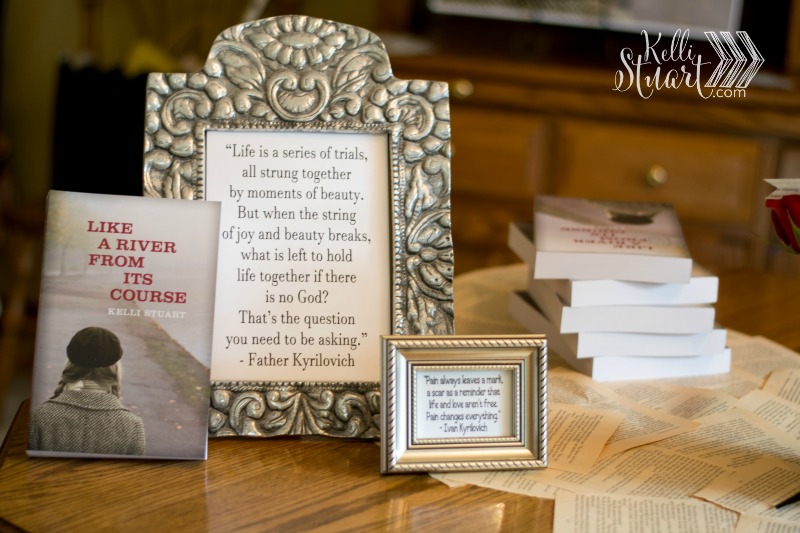
Writing a book about World War II is daunting. The market is fairly saturated with stories from that era, so how would I write about those days in a way that was fresh and new? I needed to add an element of realism to make those wretched years come alive.
I spent countless hours researching the events that took place in Kiev, Ukraine, with the largest tragedy occurring at Babi Yar, the “killing ditch” where roughly 34,000 men, women, and children were killed in just two days time.
The mastermind behind that horrific event was a man named Paul Blobel.
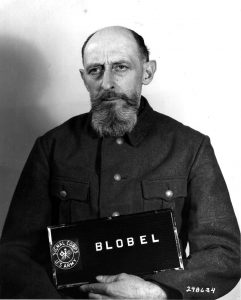 A wicked, wretched little man, Blobel not only took credit for ordering thousands of Jews killed, but he was known to speak highly of his involvement in these mass executions.
A wicked, wretched little man, Blobel not only took credit for ordering thousands of Jews killed, but he was known to speak highly of his involvement in these mass executions.
In one of the books I read, a story was told of the day that Blobel and one of the Gestapo leaders drove past Babi Yar. The decomposing bodies of the Jews lay smoldering in the narrow ravine, and as the story goes, Blobel looked at the smoke, rising into the air in plumes of heartache, and said to his comrade, “This is my ditch. Isn’t it grand?”
The level of hatred that this one man possessed, and the demons that operated from his shell of a body were hard for me to comprehend. There were days when I had to swallow hard the bile of anger as I considered his actions, and those of the many like him.
It is these aspects of the book that make the story gritty and tough to read. I couldn’t possibly gloss over the sheer darkness of those days and somehow honor the fallen. If we are to respect their memories at all, then we must respect the wretched ways in which they died.
[Tweet “Like a River From Its Course is a story of the past. But it’s a message for today.”]
Including some of the real life characters in the book gave me a chance to show the extreme depravity of these men. But it also shined a light on the beauty and resilience of those who fought and survived those years.
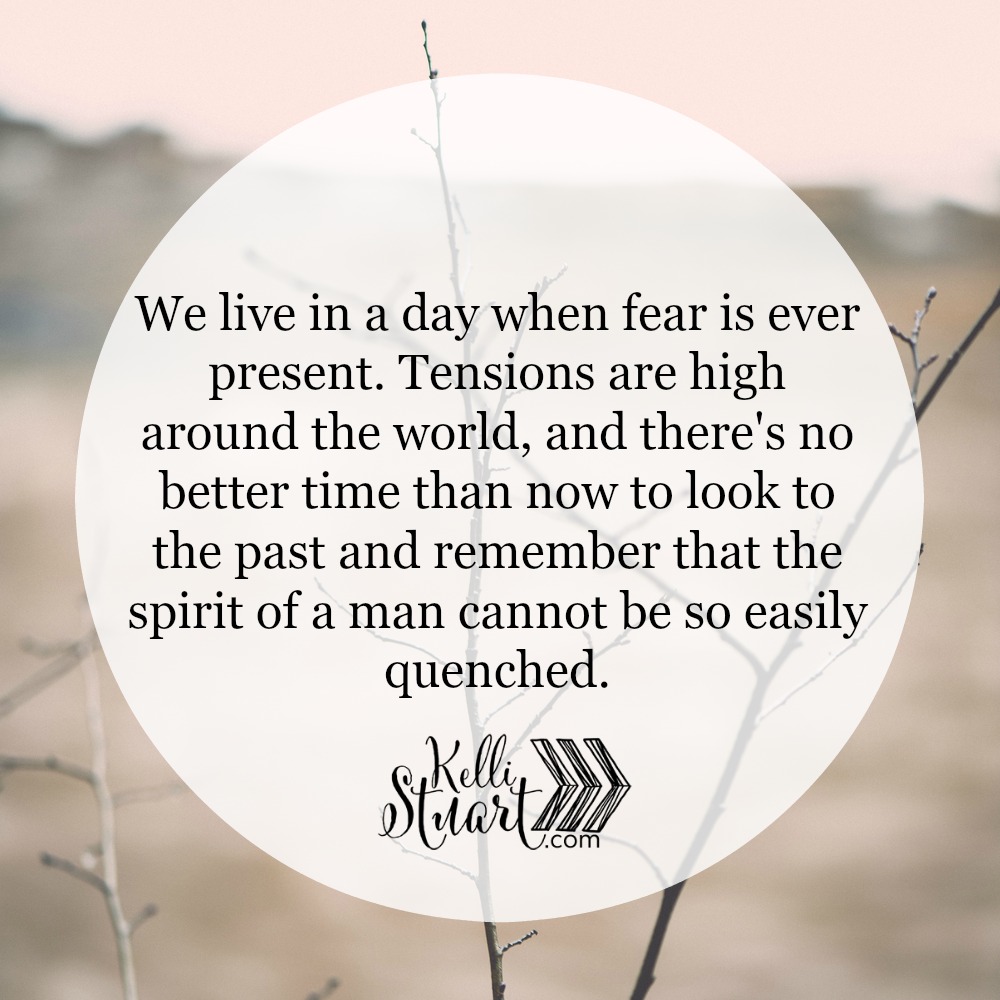
Juxtaposed against Paul Blobel’s ugliness was the beauty of Ivan Kyrilovich, a man who was willing to give his life for his Jewish neighbors. Maria Ivanovna was willing to take a beating for her friend. Luda Michaelvna chose love over hatred after being assaulted. Sergei Ivanov worked as a partisan, despite the danger it put him in.
For all the horror of World War II, there was a whole lot of hope, and when you start mining through all these stories you find that the wretchedness of men like Paul Blobel cannot withstand the ultimate beauty of the human spirit.
We live in a day when fear is ever present. Tensions are high around the world, and there’s no better time than now to look at the past and to remember that the spirit of a man cannot be so easily quenched.

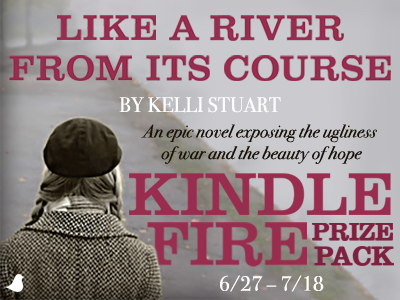
There’s still time to enter the Kindle Fire Giveaway if you haven’t done so yet. It’s quick and easy to enter, and the prize is great! You can win a copy of Like a River Form Its Course, a Kindle Fire with the case of your choice, and a $30 Amazon gift card.
*this post contains affiliate links*
by Kelli Stuart | Like a River From Its Course, Novel, publishing, World War II, Writing
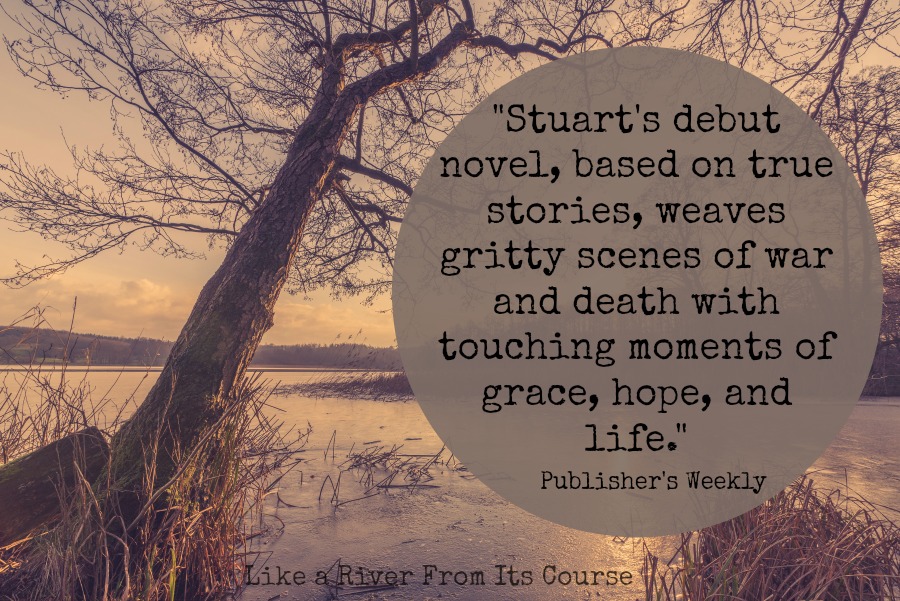
When I first set out to write a novel set in World War II Soviet Ukraine, I did not intend to add an element of faith. This was, after all, a time of great spiritual oppression, with Stalin’s communist regime silencing anyone who might pose a threat to them. And there was, perhaps, no people group greater persecuted than those of the Church.
I met three fascinating World War II survivors in Odessa, Ukraine, all of whom had been Christians in those dark days of war. Two of the men were forced to serve in the penalty battalion of the Red Army after they were caught hiding and harboring Jews. Both credited God’s protection for their survival.
I wanted to tell these stories and, in fact, in one of the earlier versions of Like a River From Its Course, I did have a storyline that was based on one of these men’s experiences. But it became apparent early on that not all the stories could be told.
It would have been an impossible book to read.
So I whittled the stories down to four, and I planned to leave the spiritual component out of the book altogether. But then I began to wonder…
What does war do to a person? In the case of Ivan, after having survived the horror of Babi Yar, how would such an experience define how he saw the world? Would there be any questions of God in such a time of darkness?
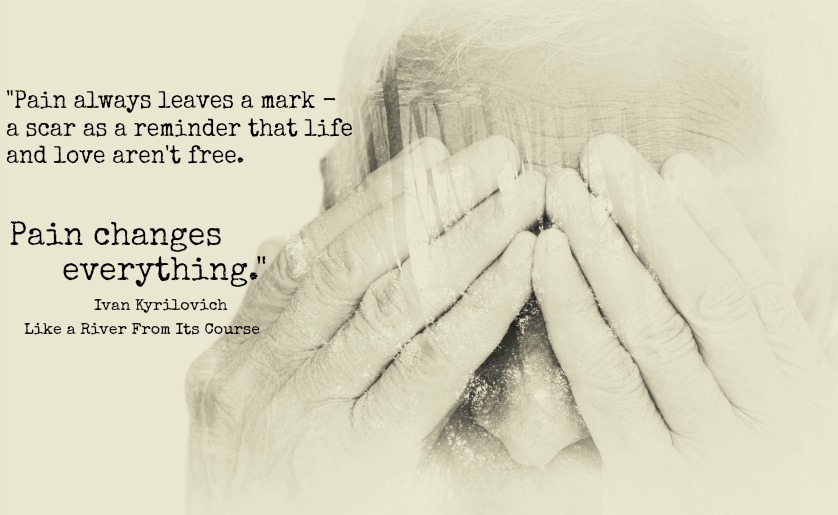
I began to research how people of faith responded to the Nazi invasion, and I discovered that in the years between 1941-1945 there was a resurgence of the Church throughout the Soviet Union. Long oppressed and forced underground, they experienced a bit of freedom during the war years because the leadership of their country was so occupied with the fighting.
And so I began to explore the idea that perhaps people sought out answers to some really tough questions during that time. These were people who had survived the collectivization of their farms, Stalin’s purges in which millions of innocent people were sent to the Gulags if they were at all perceived threatening, and the famine of the early ’30’s that decimated the population.
Ukraine was particularly hard hit in these arenas. But there’s something else that’s important to understand: Ukraine was once the centerpiece of Christianity in that part of the world.
Tradition tells the story of the apostle Andrew visiting Kiev in his missionary journeys, and it’s said that Princess Olga was one of the first in the monarchy to accept Christianity. In 988, Princess Olga’s grandson, Prince Vladimir the Great, established Christianity in its Byzantine-Slavic rite as the national religion of Kievan-Rus.
The Church has a long history in Ukraine, which made the exploration of how a character would seek God in communist USSR a fascinating topic for me.
But here’s the kicker: I needed this to be authentic.
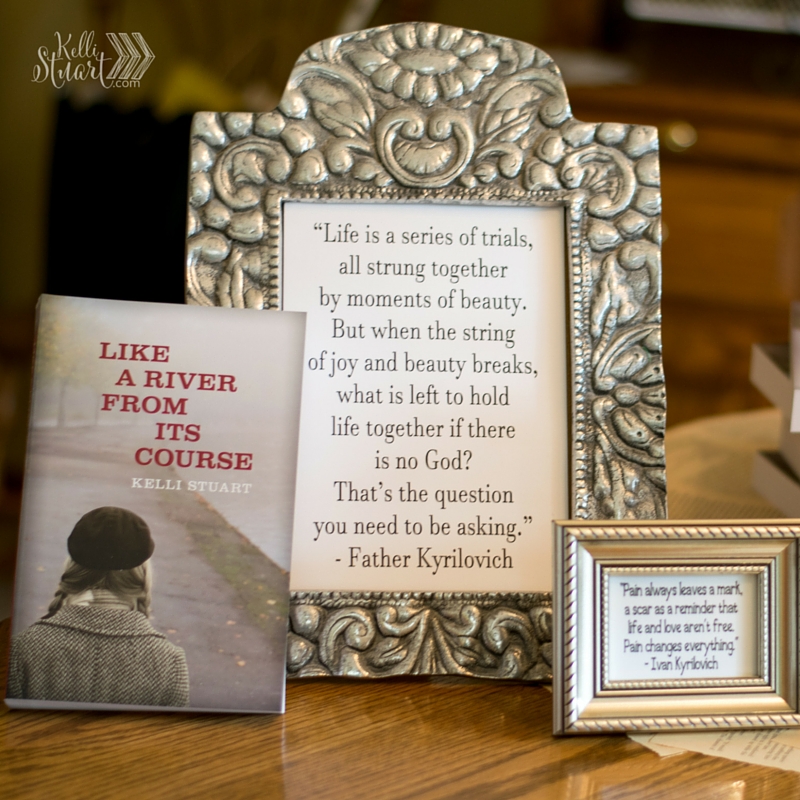
I’ve had a couple of emails from readers now, and at least two comments in the review section of Amazon, questioning the spiritual storyline of the book. One comment said the spiritual thread was nearly non-existent, and what was there felt like Catholicism.
That was intentional.
Ivan Kyrilovich was a man raised under the talons of communism. Thanks to the quiet prayers of his mother, he had at least some exposure to faith, but it was minimal. I wanted his journey to be one of questioning. I wanted to show that he struggled with this concept of faith, because wouldn’t he?
Wouldn’t you?
I couldn’t wrap a neat little bow around this quest for faith, because the truth is that after the war, the church had to move back underground. My intention wasn’t to show some western-like grand conversion, but rather to display nuggets of truth inside one man’s quest for understanding.
As for how the faith played itself out, the predominant form of Christianity present in those days (and dating back to Vladimir the Great) was the Russian Orthodox Church, which does look very similar in nature to Roman Catholicism.
Mary plays a big role in the Russian Orthodox faith, as do the many saints. There is the belief that you have a saint who shares your name, and you can pray specifically to that saint when in need.
Icons also play a major role in the Church, and if you ever have the chance to visit an Orthodox church in the former Soviet Union, I hope you’ll study the icons closely. They are fascinating pieces of art depicting a long oppressed and persecuted faith.
If I was going to write an authentic story, then I needed Ivan and Tanya’s quest for faith to be authentic. It wasn’t going to be western in any way. It had to be real to both the time and the culture.
Beyond that, though, my prayer is that we can all be encouraged by the brief message of faith in Like a River From Its Course. For many years, man attempted to erase God from that land. They sent religious leaders to prison camps, turned churches into communist training facilities, and threatened anyone who attempted to spread Christianity with death.
But faith is not so easily snuffed out.
In the midst of one of the darkest periods of history, the Church surged back into the land and provided hope where there seemed to be none. In the words of Father Kyrilovich, “Life is a series of trials, all strung together by moments of beauty. But when the string of joy and beauty breaks, what is left to hold life together if there is no God?”

If you haven’t entered the Kindle Fire giveaway yet, hop on over and do so now. Entering is easy, and the prize is great! A copy of Like a River From Its Course, a Kindle Fire with your choice of case, and a $30 Amazon gift card.

And, as always, keep those reviews of Like a River From Its Course coming!
Happy Tuesday, everyone!
*this post contains affiliate links*
by Kelli Stuart | Like a River From Its Course, Novel, publishing, Ukraine, veteran's stories, World War II
It’s funny how God puts people together.
Lee and I were freshly married and just beginning our life together in Frisco, Texas. We’d been in town for one week when we got together with a couple whose names I do not remember, nor do I recall how we were connected with them in the first place. I just remember going to lunch and telling these strangers that I needed a way to keep practicing my Russian language so I didn’t lose it.
“Oh, I know the perfect place!” the strange lady said. “There’s a gymnastics academy here in town run by Russians. You should go in an talk to them, and see if there’s a community here to get involved in.”
The next day, I visited the World Olympic Gymnastics Academy for the first time. Sometimes, I chuckle at my tenacity. I walked in and told the receptionist I was looking for someone who would speak Russian with me. She looked at me as if I had two horns growing out of my head, then led me into the gym and introduced me to Valeri Liukin and Evgeny Marchenko.
“I want to practice my Russian,” I said. Valeri cocked his head to the side slightly and smiled.
“Do you know anything about gymnastics?” he asked.
It just so happened I had been a competitive gymnast as a kid, and had coached on and off through high school and college. I nodded my head and he looked at Evgeny.
“Do you want a job?” he asked.
And so it was that I began working at WOGA not because I was looking to be a coach, but because I was looking for Russian speaking community. For two years, the coaches at WOGA took me under their wing, inviting me to parties, answering my incessant questions, helping me understand the nuances of the language I loved, and so much more.
They were my people, and it was them I was saddest to leave when we moved away.
The year after we moved, I contacted Evgeny with yet another odd request.
“I’m going to Ukraine to interview veterans for a book I want to write. Do you have any contacts there who can help me?”
It so happens, Evgeny’s mom lived in Vinnitsya, Ukraine, and within a week it was all set up for me to spend a few days with her.
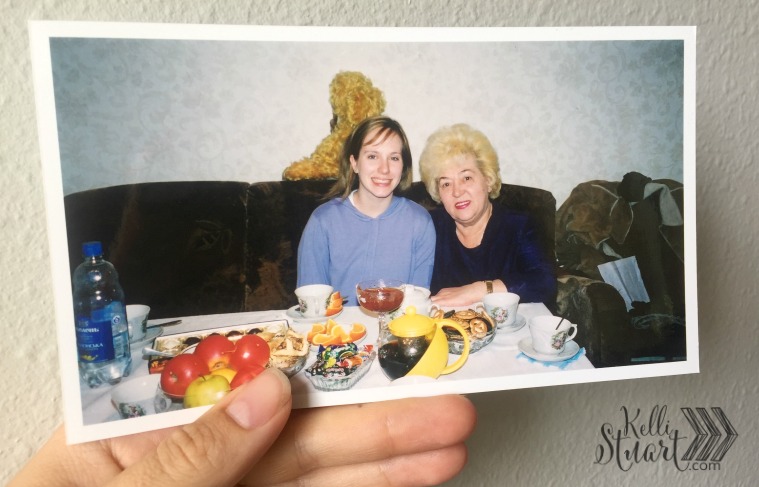
A pregnant, sick Kelli, with Victoria and her table full of food!
Victoria Marchenko welcomed my mom and I into her home with open arms, and a table brimming with food. I was sick when I arrived, having picked up a terrible cold on the trip, and she immediately took it upon herself to cure me with tea and vereniki (think dumplings filled with meat – yum!).
Victoria was a true gem. She mothered me for the next two days as she took me around town, introducing me to some of the most fascinating people I would meet in all my travels.
She took me to the home of her friend, Elizabeta Semenova, a woman who worked as a partisan and whose experience became central to the story of Luda.
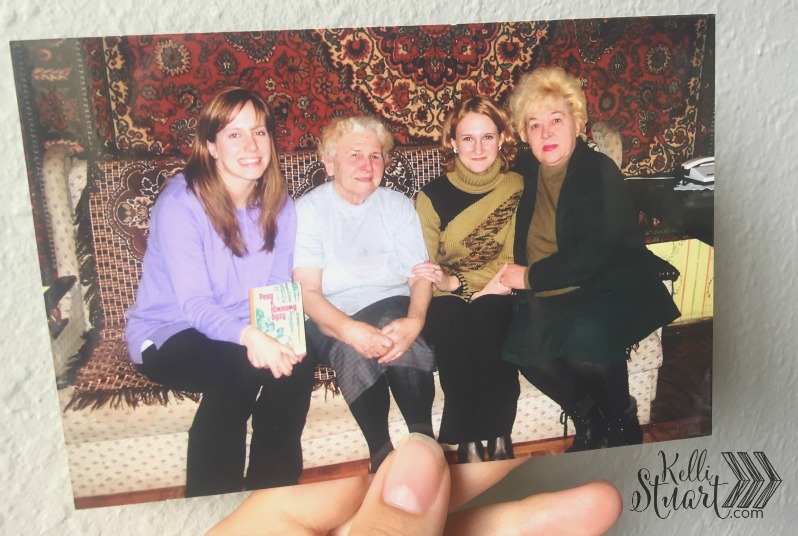
Me, Elizaveta, my dear friend Sveta, and Victoria in Elizabeta’s home.
She took me to a group of veterans who were one of the liveliest bunch of men I’ve ever met. They told their stories one at a time, and Victoria sat in the corner taking it all in. You could tell she was respected and admired within her community, and I felt a sense of pride just being in her presence. Somehow I knew I’d found a very special lady.
Victoria also told me about Vervolfy, Hitler’s underground bunker built just on the outskirts of Vinnitsya. Now just a meadow with no seeming significance (though the site has never been excavated, which gives it a mysterious quality), Victoria made sure I understood the gravity of what occurred at that place. Her description was so vivid and passionate that when I finally visited the site in person, I felt a hallowed awe for the men and women who died there.
This book wouldn’t have come together the way it did if it weren’t for Victoria Marchenko.
It wouldn’t have come together at all if I hadn’t been to audacious to walk into that gym so many years ago and just ask someone to talk to me. I mean, really – WHO DOES THAT?!
What a lovely thing it is to see the tapestry of this project woven together for such a time as this.

Speaking of the book, it’s time for another GIVEAWAY!

Litfuse Publicity Agency started their blog tour for Like a River From Its Course, and you have the opportunity to win big! They’re giving away a copy of the book, a Kindle Fire, a Kindle Fire case (winner’s choice), and a $30 Amazon gift card. And the best part is, it’s super easy to enter!
Don’t let this stop you from purchasing the book, though! Order your copy of Like a River From Its Course* today and find out why people are calling it the best book they’ve ever read.
If ever there was an opportunity for me to honor the memories of Victoria Marchenko, and all the men and women to whom she introduced me, this book is it.
Thanks for honoring them with me!
*affiliate link included
by Kelli Stuart | Like a River From Its Course, Novel, publishing, Ukraine, World War II, Writing
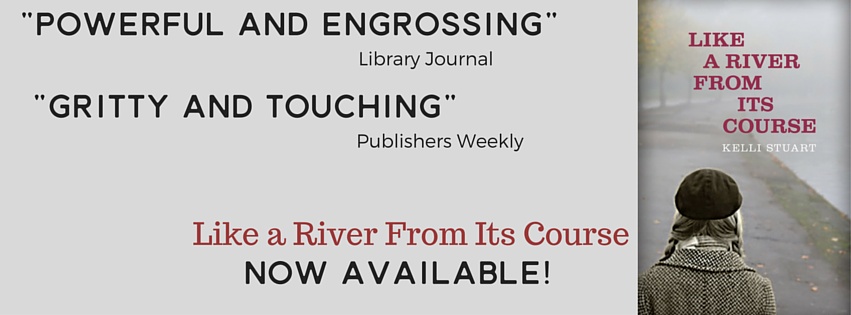
Well here we are.
After years of research. And a few more years of seeking representation. And then a few months of seeking publication. And then another year of editing and marketing and incessantly talking about the book.
HERE IT IS!
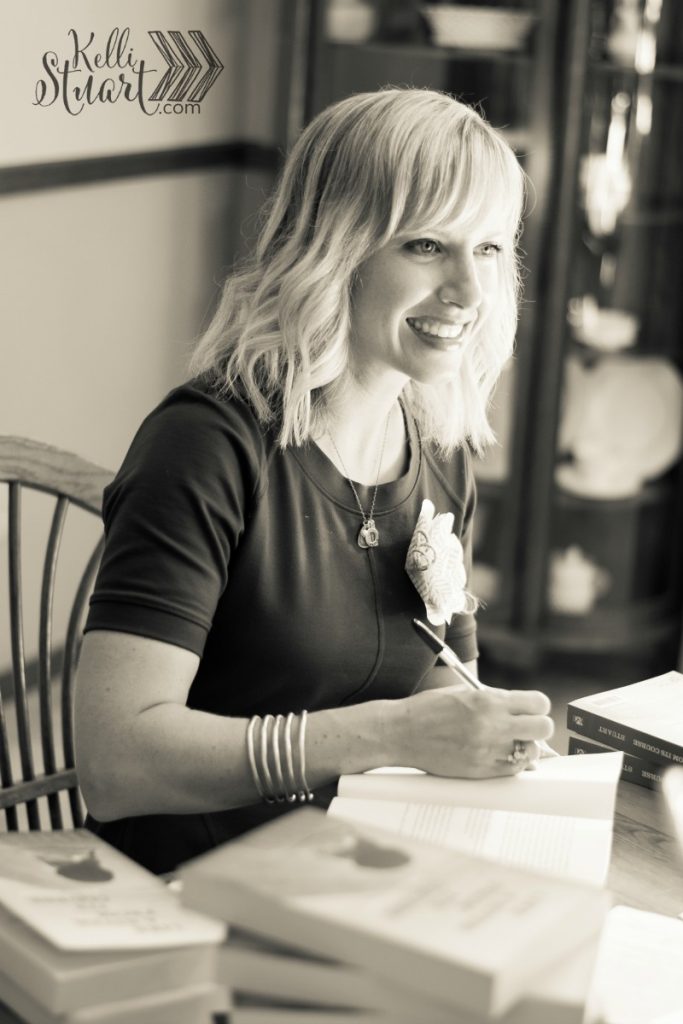
Like a River From Its Course officially launches today. This is the day I’ve been waiting for since I was 22 years old. This is the day I dreamed about.
These are the stories I wanted the world to hear.
I pray I’ve done them justice. I pray that the men and women who are represented by this book are honored, because my deepest heart’s desire is to prove that there are still stories we haven’t heard.
In a world that feels unpredictable and frightening, I wanted to offer a book that gave hope. Four years ago, I visited Tanzania with Compassion international, and in the deep red soil of Africa, the Lord imprinted upon my heart the words that would become my life’s anthem:
The evidence of that truth becomes more and more clear to me with each passing day. Hope is slow. But oh my friends, hope is alive. It is so alive, and it’s real, and when the world feels dark and scary and uncertain, we can cling to the fact that hope is here.
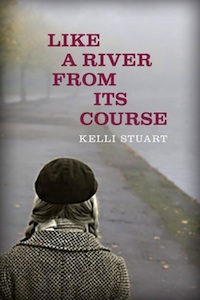 We need the stories in this book for such a time as this. We need to be reminded that man cannot be so easily broken. We need to recall a time when people rallied against a greater evil. We must remember the men and women who put their own lives on the line so that they could protect their neighbors.
We need the stories in this book for such a time as this. We need to be reminded that man cannot be so easily broken. We need to recall a time when people rallied against a greater evil. We must remember the men and women who put their own lives on the line so that they could protect their neighbors.
We need these stories. And we need them right now.
I don’t know if I’ve done a good job with this book launch. I don’t know if I’ve become annoying with all the promoting and marketing. I don’t know if I’ve spoken to the right people. Maybe I’ve been too forward. Maybe I’ve been too timid.
I’ve made mistakes along the way, and I’ve learned a whole lot in the process.
But today I know that none of that matters. Today is a celebration because today the book is officially out in the world.
Today I can finally say I delivered on my promise to share these stories.
Today I can say I’ve seen a dream fulfilled.
Today I give these stories as a gift to you. Please treasure them because they’re precious.
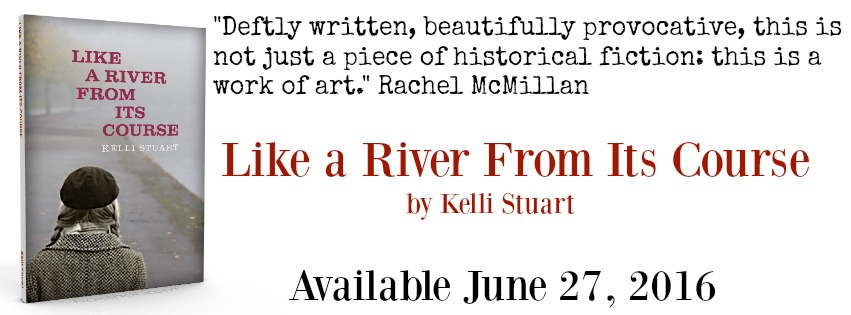
And today I say thank you to all the people who have cheered me on.
Thank you to the people who wouldn’t let me give up when I wanted to throw in the towel.
Thank you to the people who were waiting at the finish line with chocolates and cheers of excitement.

Thank you to the people who don’t know me, but who agreed to take a chance on a debut novel by an unknown writer. Thank you for taking that chance, and for sharing how the book impacted you.
Today is LAUNCH DAY!
I’m proud of this book. I am proud because it’s the stories of a beautiful people who I love as my own. I’m proud to bring their stories to the rest of the world.
Happy LAUNCH DAY!
Like a River From Its Course is now available for purchase on Amazon, Barnes and Noble, ChristianBook.com, and wherever books are sold.

Want to help me spread the word? (Say yes)
Visit the book page for images, links, and tweets that you can quickly and easily share with your followers!
Post the link to purchase the book on Amazon.
Post a photo of yourself holding the book, and tag me in it so I can say THANK YOU!
Join the Thunderclap – I need 59 more people to sign up for the campaign to take effect.
Tell your friends, neighbors, colleagues about the book!
Request the book from your local library!
If you’re connected to anyone in the media who could help me spread the word, I’m looking for contacts!
Anything you can do to help is deeply appreciated!
Thank you!
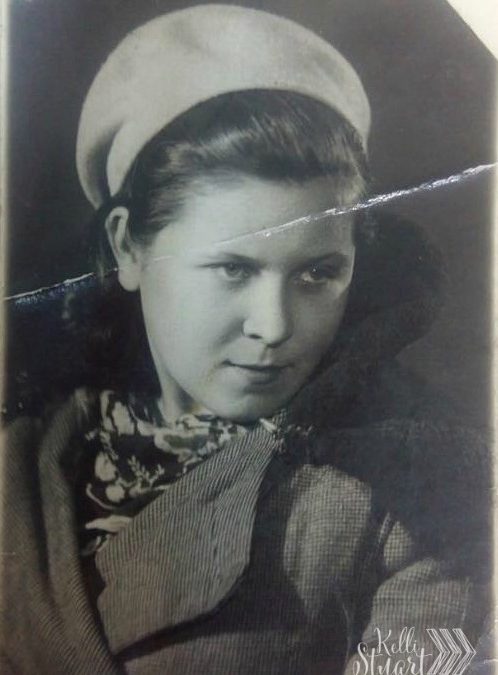
by Kelli Stuart | Like a River From Its Course, Novel, Ukraine, veteran's stories, World War II, Writing
I spent the better part of two days last week tearing my house apart.
I was on a search for a photo. I could see the picture in my mind, but it wasn’t any of the places I imagined I would have put it. The up side to all this searching was the natural consequence of cleaning out drawers that desperately needed to be cleaned.
I finally decided to check the attic, even though I knew for certain the photo couldn’t be up there. Hadn’t I seen it recently?
I opened the first album I found and gasped. There she was, just as I remembered her, staring up at me with those kind, smiling eyes.
Ladies and gentlemen, I would like to introduce you to the real Maria Ivanovna.
Maria’s story is fictionalized in my novel, though of all the storylines, hers stays truest to the real life plot. Some of it is fictionalized based on other stories that I gathered, but the skeleton of the entire book started with this woman right here:
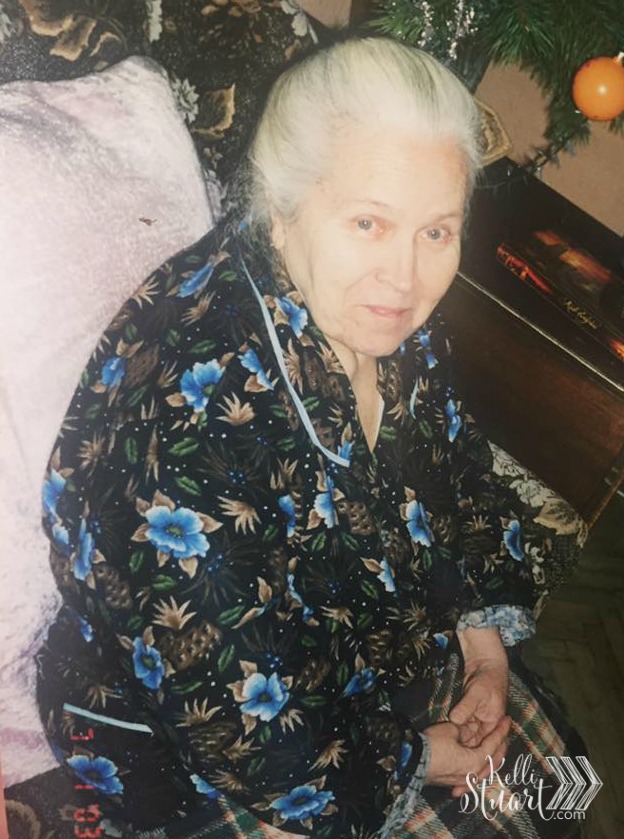
Isn’t she just lovely?
And as I mentioned in the post about Baba Mysa, that character was also a composite of this real and lovely woman who entrusted me with her story so long ago.
After I found this one photo, I was hungry for more, so I reached out to my dear fried in Ukraine, who also happens to be Maria’s granddaughter, and I asked for more photos.
Alyona took me into her home when I was 20 years old, and she gave me her bedroom for four months so that I could study Russian. Every day, I’d walk from her little apartment on Shamrila Street to the train station, and I’d make the hour long trek to the Institute of Foreign Languages for my classes.
It was one of the grand adventures of my life.
The photos Alyona sent me brought tears to my eyes, because they brought not only the character of Maria Ivanovna to life, but they also gave me more of a visual for the real Maria.
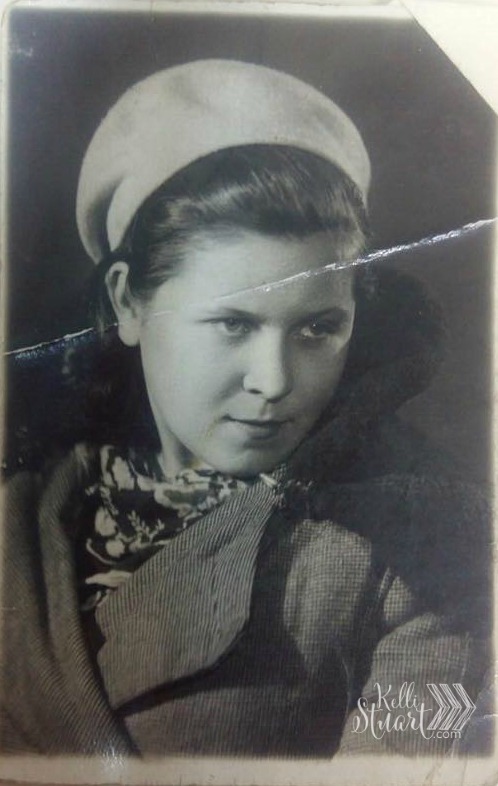
Maria as she was making her escape from Germany.
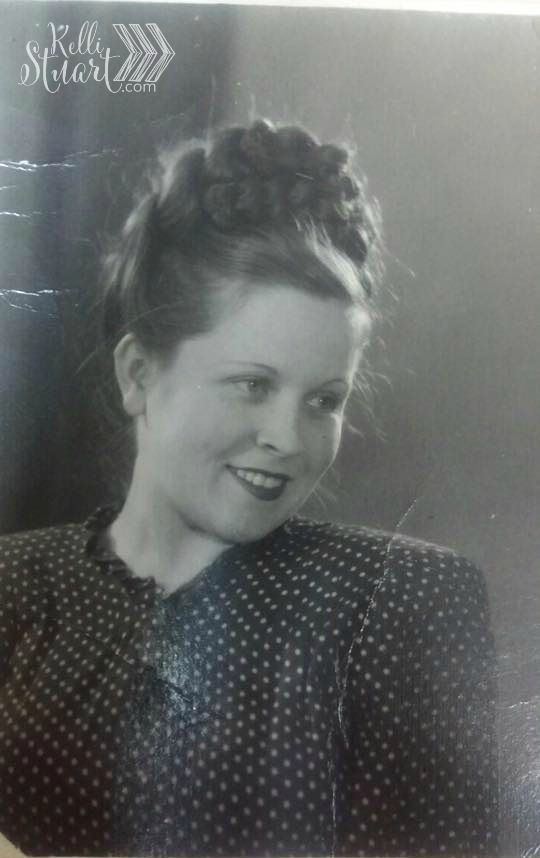
Maria after the war.
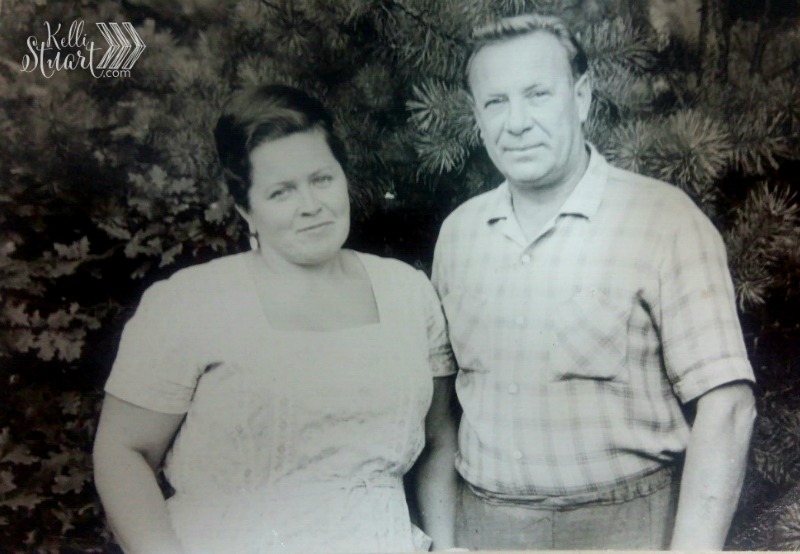
Maria and her husband.
It’s easy to forget sometimes that history is real people. It isn’t just stories. When we’re so far removed from an event that is now immortalized in film, television, and history books, we overlook the before and after of all this history.
Maria had a history before the Germans forced her into slave labor, and she had a future after she returned. She was more than the moment of her captivity. She was real, and she was a delight.
The final picture I found was taken on the night that I met Maria face to face. It was 1996, and we were in Kiev, Ukraine. I had been invited to have dinner at Maria’s place, and while there, she shared her full story with me.
That was the birth place of Like a River From Its Course.
Now, before I show you this picture, I would like to sincerely apologize for what I’m wearing. I don’t ever remember owning such a sweater. It appears I let Mr. Rogers dress me for that evening.
You’ve been warned.
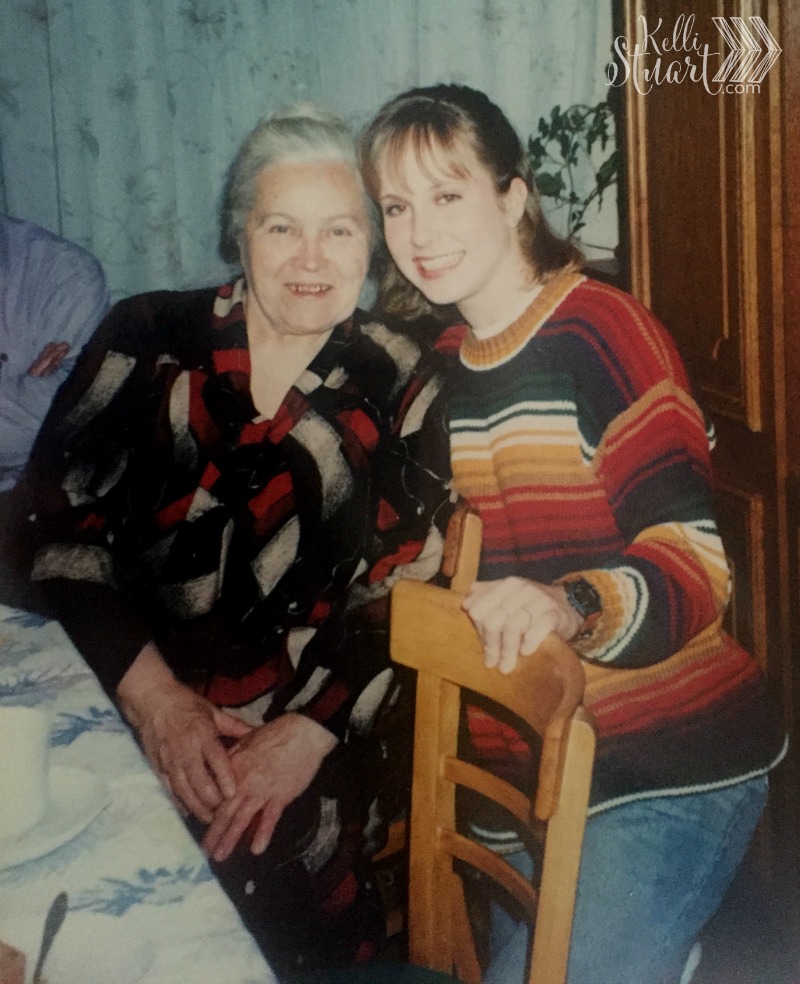
Kelli (in a most unfortunate sweater), and Maria. April, 1996.
History is real people, and as you read my book, I hope you will remember that these are more than just stories. These were lives. These were men and women who refused to be defined by one moment in time.
In the wake of all that’s occurred in our own country this week, it’s good to remember that we are more than one horrific event. We can still learn from history. We can honor the fallen, pick up the pieces, and refuse to be defined by that terrifying moment.
History is real people, and history is happening even today.

 Like a River From Its Course is now available wherever books are sold!*
Like a River From Its Course is now available wherever books are sold!*
Also, if you’ve read the book, would you be so kind as to leave a review on Amazon or Goodreads? Those are kind of a big deal. *wink*
Thanks, everyone!
*affiliate link included
![]()


 A wicked, wretched little man, Blobel not only took credit for ordering thousands of Jews killed, but he was known to speak highly of his involvement in these mass executions.
A wicked, wretched little man, Blobel not only took credit for ordering thousands of Jews killed, but he was known to speak highly of his involvement in these mass executions.








 We need the stories in this book for such a time as this. We need to be reminded that man cannot be so easily broken. We need to recall a time when people rallied against a greater evil. We must remember the men and women who put their own lives on the line so that they could protect their neighbors.
We need the stories in this book for such a time as this. We need to be reminded that man cannot be so easily broken. We need to recall a time when people rallied against a greater evil. We must remember the men and women who put their own lives on the line so that they could protect their neighbors.







